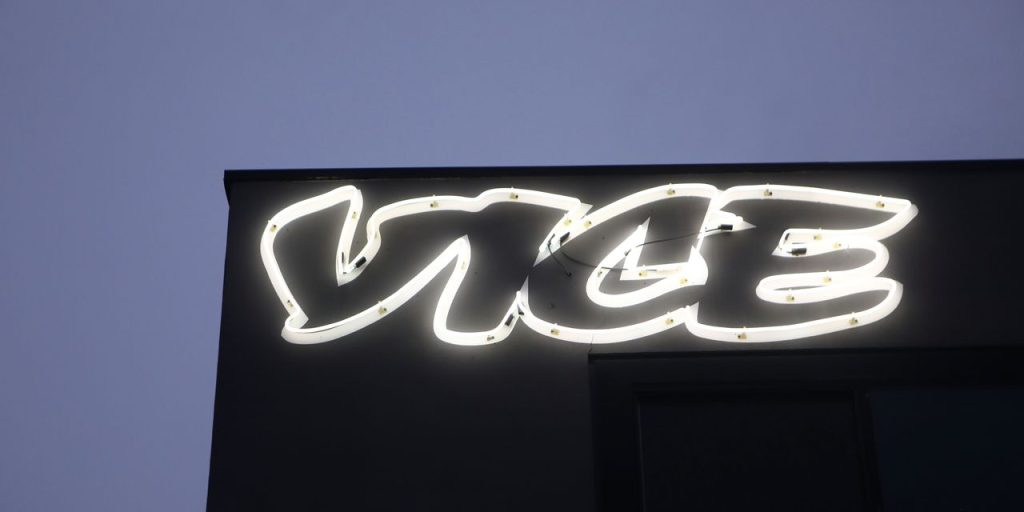Vice Media said it’s reached a deal to be bought by lenders after filing for chapter 11 bankruptcy protection, one of seven companies to do so through early Monday in a busy weekend.
The flurry of filings comes at a time when higher interest rates are creating stress for many companies as central banks fight high inflation and as companies rein in costs and cut staff.
Vice, which was once valued at $5.7 billion, said it’s going to be bought by a lender consortium including Fortress Investment Group, Soros Fund Management and Monroe Capital for $225 million. The chapter 11 bankruptcy filing means that outside partners will be able to submit higher or better bids.
Vice said all of its brands including Vice and Vice TV will continue to operate and produce content. “Substantially all” of its international entities, as well as its joint venture with A&E, are not part of the chapter 11 filing, Vice said.
Last month Vice shut down its weekly news broadcast and cut more than 100 jobs, The Wall Street Journal reported. BuzzFeed
BZFD,
last month shut down BuzzFeed News.
See also (from April 20): BuzzFeed stock plunges over 20% as media company shuts down BuzzFeed News, cuts jobs
Vice was not alone in heading to bankruptcy court.
Envision Healthcare, a physician-staffing company for emergency rooms, surgical suites and ICUs that’s backed by private-equity firm KKR & Co. Inc.
KKR,
filed for chapter 11 early Monday with plans to restructure the parent and its AmSurg ambulatory surgery unit and separate them into two businesses.
The company has agreements with about 60% of the lenders of its roughly $7.7 billion of debt.
The company was acquired by KKR in 2018 in a $9.9 billion deal, but has been hurt by dwindling patient volumes during the pandemic, by health insurers excluding it from their networks, by what it called the “flawed implementation” of the No Surprises Act, which prohibits the practice of balance billing, and by a national clinician shortage and rising inflation.
The bankruptcy is expected to be one of the biggest in the healthcare sector and to wipe out KKR’s roughly $3.5 billion stake in the company, The Wall Street Journal reported.
Venator Materials PLC
VNTR,
said it has reached agreement with the “overwhelming majority” of its lenders on a recapitalization plan to be implemented through a prepackaged chapter 11 bankruptcy.
Nearly all of the U.K.-based chemical products maker’s debt will be converted to equity. The bankruptcy will be financed by a debtor-in possession (DIP) financing that includes $275 million in financing from the company’s creditors.
The business is expected to operate as normal during the bankruptcy, and the company will continue to pay wages and benefits to its employees and to pay all trade partners.
The stock is expected to be delisted from the New York Stock Exchange.
“We have faced unprecedented economic headwinds, including significantly lower product demand and higher raw material and energy costs in the second half of 2022, but Venator’s management, alongside our advisers, has worked tirelessly to assess all viable options available to us to ensure the long-term sustainable success of the company,” said Venator Chief Executive Officer Simon Turner.
Then there’s Athenex
ATNX,
a biotech that specializes in cancer treatments, that said late Sunday it has filed for chapter 11 bankruptcy with an agreement with lenders to pursue an expedited sale of its assets. The company is expecting to complete the sale process by July 1 and to continue the chapter 11 after that to resolve claims and wind down its business in an orderly fashion.
Chief Executive Dr. Johnson Lau said the company had succeeded in bringing tirbanibulin, a treatment for actinic keratosis, or AK, through regulatory approvals, to the U.S. market and a number of EU countries, as well as Taiwan. AK is a rough, scaly patch on the skin caused by years of sun exposure.
“Unfortunately, our oral paclitaxel product candidate received a complete response letter from the U.S. Food and Drug Administration, and this significant regulatory setback, coupled with challenging biotech markets and the difficult economic environment, put tremendous pressure on our ability to continue to fund our businesses,” Lau said in a statement.
Paclitaxel is a treatment for breast cancer.
The company is now seeking a buyer who will continue to develop its drug candidates and bring them to market.
Rounding out the list:
Kidde-Fenwal Inc., an industrial fire-detection and suppression business owned by Carrier Global Corp.
CARR,
filed for bankruptcy on Sunday, to cope with more than 4,000 lawsuits alleging that a foam product sprayed over burning liquids caused injuries and property damage, the Journal reported.
Privately held oil producer Cox Operating LLC filed for chapter 11 in the Southern District Court of Texas, Bloomberg News reported. The company has estimated liabilities and assets of $100 million to $500 million and was founded by oil veteran Brad Cox.
Monitronics International Inc., a Dallas-based company that operates as Brinks Home Security, filed for chapter 11 for a second time with estimated assets and liabilities of $1 billion to $10 billion, Bloomberg reported.
Read the full article here
